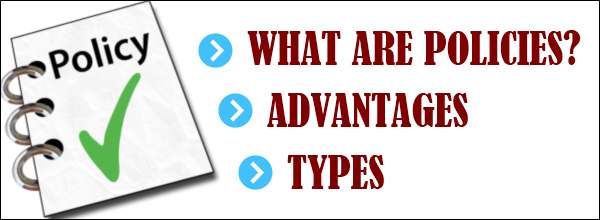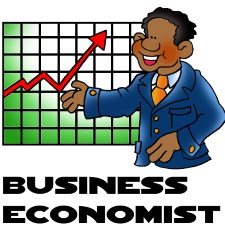What are Policies | Advantages | Types

Table of Contents
What are Policies?
Policies are general statements that guides in decision-making. A policy refers to a continuing decision which applies to repetitive situations. It is standing answer to a recurring question. Policy decisions are taken by the Chief Executive and Board. Manager should get the participation of all his subordinates in policy making.
Policies may be in the form of written statements or just by way of oral understandings. Policies should be clear, stable, understandable and observable. Only then they can serve their purpose. Policies serve many purposes. Repetitive situations can be easily faced by the managers by one blanket decision through policies.
Objectives vs Policies
Objectives provide the goals to be achieved, whereas policies provide broad guidelines for all operating managers as to how these may be achieved. Generally, policies provide guidelines for a longer period than strategies which may have to be changed according to the changes in external environment. Policies, usually, are broad in scope and are comprehensive, flexible and dynamic. They may be taken as a code which points to the direction in which top management desires to channelize the energies of managers and others in the organization. Policies have been described as the foundation of management in action.
Advantages of Policies
1. They save time by serving as precedents.
2. They aid in coordination.
3. They provide stability in the organization.
4. They help the manager to delegate authority without undue fear.
5. They serve as guides to thinking and action and thereby facilitate quick and accurate decisions.
6. They provide a more refined and flexible approach to recurring problems.
7. They translate objectives into a workable form.
8 More decisions can be taken at lower levels of hierarchy.
9. In the absence of a policy, similar questions must be considered time after time.
10. Policies can speed up decision-making by providing a blanket framework. They summarize the past experiences.
11. Policies are one of the important means for building predictable behavioral patterns in an organization. They ensure that the planned operations are not deviated unnecessarily.
12. Policies helps to achieve coordination.
Types of Policies
Policies may be classified as originated, implied, appealed and externally imposed policies. Let us discuss them briefly.
1. Originated Policies: Originated policies are formulated by top level management, by reference to the objectives of the organization and their achievement. The purpose of these policies is to guide the actions of their subordinates. Sometimes, these policies are formulated in active consultation with managers at lower levels.
2. Implied Policies: Implied policies are those evolved by themselves when a series of decisions are made by managers over a period of time. These policies exist in an unwritten form. They are not consciously formulated but emerge from recurring managerial decisions.
3. Appealed Policies: Appealed policies are formulated at the higher managerial level in response to appeals made by lower managerial levels. These policies may also exist in the form of precedents and serve as guides for decisions in future.
4. Externally Imposed Policies: Externally imposed policies are those policies which are influenced by the policies of the Government and other public agencies, trade unions, trade associations, etc.

